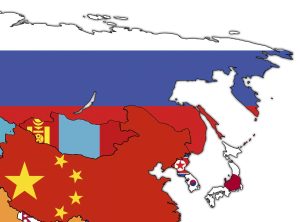Chinese President Xi Jinping’s state visit to Moscow in late March and his meeting with Russian President Vladimir Putin shifted the global spotlight to Northeast Asia. In Mongolia, the country’s close proximity to Beijing and Moscow has created unease with the prolonged Russia-Ukraine war and the China-U.S. economic tensions. Despite these geopolitical conundrums, Ulaanbaatar’s foreign policy adheres to its longstanding approach of maintaining strong ties with its geographic neighbors, while actively engaging the “third neighbor” countries.
In the days leading up to the Putin-Xi meeting and throughout the three-day visit, the increasing attention to Northeast Asia stressed the growing importance of Ulaanbaatar’s geopolitical position as a single democratic country sandwiched between two growing authoritarian regimes that are deemed to be anti-Western.
However, to Mongolia, a meeting between the leaders of its neighbors is nothing unusual. In fact, during these high-level meetings, Mongolia seeks economic and cooperation opportunities to strengthen diplomatic and economic trilateral ties. One major development that was reportedly under discussion between Xi and Putin was the potential launch of the Russia-Mongolia-China trilateral Power of Siberia-2 pipeline.
Mongolia hopes to become a transit partner for its neighbors. Mongolian Prime Minister Oyun-Erdene Luvsannamsrai mentioned the necessary steps of this mega project in a separate interview before the Putin-Xi meeting. He told Reuters, “After Russia and China decide on the pricing, Mongolia will decide on how they can use its territory to transport the gas.”
Beyond the importance of Mongolia’s economic gains from such a high-level meeting, Ulaanbaatar, too, hoped that Xi could convince Putin to seek a peaceful solution to the ongoing war in Ukraine, so that China and Russia can continue their strong relations. As it currently stands, Beijing might be feeling pressure from the international community.
While the current geopolitical context has shifted, China-Mongolia-Russia trilateral relations are well positioned to weather the storm. Their trilateral mechanisms are historically rooted but also extremely relevant today.
Ulaanbaatar’s trilateral relationship with Beijing and Moscow is driven by the interconnectedness of the three countries’ economies, particularly in the energy sector. Mongolia’s abundance of minerals makes China an crucial economic partner. Moscow, on the other hand, is irreplaceable as an energy supplier. Hence, from this point of view, it is important for Mongolia to continue prioritizing economic ties with both Russia and China – but to do so while maintaining its democratic values.
Despite Beijing and Moscow’s increasingly authoritarian governance, Mongolia continues to adhere to democratic values and principles. The Bertelsmann Transformation Index (BTI) ranked Mongolia’s “political transformation” toward democracy at 7.25 out of a max score of 10, good for 26th out of 137 countries included in the rankings (and well above the global average of 5.4). Mongolia tops the score table for what BTI calls the region of “post-Soviet Eurasia,” which includes Mongolia as well as countries in the Caucasus and Central Asia. Russia’s political score was 4.40, in the “moderate autocracy” category, while China’s was 3.23, making it a “hard-line autocracy.” The fact that Mongolia’s governance is not following the trend of its neighbors should be recognized, even while its democracy must be strengthened constantly.
Mongolia’s bilateral relations with Russia and China go beyond Xi and Putin’s long reigns as head of state. While Mongolia’s foreign policy supports the strengthening of economic and diplomatic ties with both Beijing and Moscow, the aim is to adhere to Mongolia’s democratic concepts and principles.
Moreover, the relationship between Russia and Mongolia on one hand and China and Mongolia on the other are not the same either. But to maximize foreign policy flexibility and economic strength, Mongolia’s comprehensive strategic partnerships with Russia and China are paramount. And these relations are intertwined with history, people-to-people relations, deep cultural ties, and other important aspects that make up strong bilateral ties.
Amid the Russia-Ukraine war, Mongolia’s foreign policy will continue to support peaceful dialogues that strengthen both regional and global security. While Mongolia may refrain from getting directly involved in armed conflicts, its non-military contribution such as humanitarian assistance and disaster relief funds, deserve recognition.
While relations with China and Russia has irreplaceable value for Mongolia’s economy, what is equally important to Mongolia is each state’s peaceful, non-threatening existence and multilateral collaborations.
Given Mongolia’s geopolitical constraints, some analysts underestimate Mongolia’s third neighbor’s foreign policy due to its strong ties with Russia and China. However, oftentimes these perspectives view Mongolia from the Cold War narrative, which boxes Ulaanbaatar into the Beijing-Moscow periphery, not necessarily an independent agent of foreign policy. With this constricted viewpoint, one cannot assess the strength, potential, or significance of Ulaanbaatar’s independent foreign policy and all its working mechanisms.

































